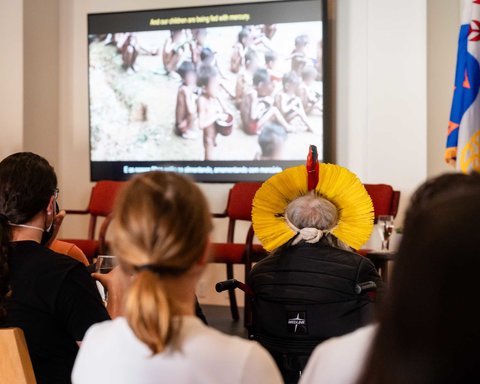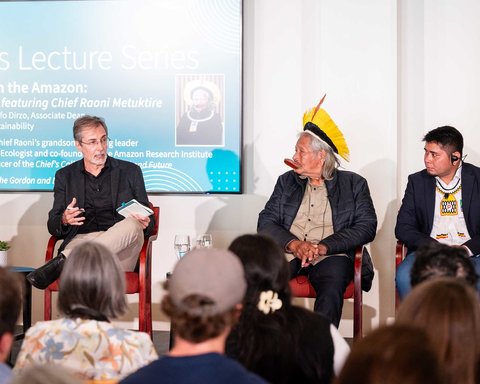On the afternoon of Sept. 24, Chief Raoni Metuktire, nonagenarian leader of the Kayapó people or, as they call themselves, Mẽbêngôkre peoples of the Brazilian Amazon, stepped delicately onto a stage at the Schwab Residential Center on the Stanford University campus. He wore jeans, a cloth shirt, a light down jacket, and simple sandals. On his head rested a brilliant headdress of radiant yellow and red feathers.
“I am a shaman,” Chief Raoni began, speaking energetically despite his 90-plus years. His interpreter and grandson, Beptuk Metuktire, translated his Mẽbêngôkre words into Portuguese, which audience members heard interpreted into English through individual earpieces. “The spirits of nature share their thoughts with me. … Nature is our family. It is our brother, our mother, our grandmother. It’s part of us and they are very concerned.”
Chief Raoni then detailed climate and environmental problems experienced on a daily basis by the Mẽbêngôkre people. Their concerns include deforestation for farming and mining, dwindling and unpredictable rainfall, polluted air and groundwater, and sweltering heat.
“We live together. We breathe the same air. We drink the same water. We’re all together on this Earth,” the Chief said to a room of about 175 people and over 75 more watching via livestream. “And I need your help so that we can continue living well.”
Chief Raoni, a 2020 Nobel Peace Prize nominee, visited Stanford as a featured guest in the latest installment of the Dean’s Lecture series at the Stanford Doerr School of Sustainability. The series brings together scholars and thought leaders to discuss the frontiers of research, education, practice, and impact related to an area in sustainability. Chief Raoni was introduced by Stanford biologist Rodolfo Dirzo, Associate Dean for Integrative Initiatives in Environmental Justice at the Doerr School of Sustainability.
“We are very fortunate that today we have one of the Amazon’s leading environmental champions sitting with us. Chief Raoni Metuktire is one of Brazil’s leading Indigenous leaders and a globally recognized defender of Indigenous rights and environmental preservation,” Dirzo said in his opening remarks following a brief slideshow presentation about the unique biodiversity and global significance of the Amazon rainforest.
“Beginning in the 1950s, Chief Raoni played a vital role establishing contact between Indigenous and non-Indigenous people to secure rights for the Kayapó and other rainforest communities. He has been a sharp critic and advisor of governments and yet an indispensable ambassador for preserving forests and environmental rights,” Dirzo said.
Maria DiGiano, program officer for the Gordon and Betty Moore Foundation’s Andes-Amazon Initiative, took the stage to present the foundation’s investment in about 26 million hectares in the Brazilian Amazon around the Xingu River basin. These investments have supported the creation of protected areas and the development of management tools in the region. The Moore Foundation co-sponsored the event.

Dirzo then invited filmmaker Lucas Ramos to the podium to introduce the exclusive screening of his yet-to-be-released documentary, “The Chief’s Call: Heritage, Land and the Future.” The 15-minute film, scored with Indigenous music and narrated by the Chief’s grandson, Beptuk, presents the environmental struggles of Kayapó people through the voices of Kayapó men and women describing their plight. It notes that while Indigenous peoples globally comprise just 5 percent of the global population, they inhabit an area that holds 80 percent of the planet’s biodiversity. The film implores viewers to accept the Chief’s message that “preserving our ancestors is preserving ourselves.”
Once on stage, Chief Raoni spoke emphatically about and for his people, even singing a melodic poem at one point. He directed responsibility for repairing the environment toward non-Indigenous people, whom he said have endangered his way of life for profit. At the same time, the Chief was not afraid to ask the big question: Will you help us save the rainforest?
“If you help us, we will do it,” the Chief concluded.
Disparate voices
For a roundtable discussion moderated by Dirzo, Paulo Moutinho, ecologist and co-founder of the Amazon Environmental Research Institute (IPAM Amazônia), joined Chief Raoni and Beptuk onstage. Moutinho, who has helped raise Chief Raoni’s profile and reveal the damage to Indigenous peoples and the environment in the Amazon, lamented the deaths of as many as 800 Indigenous leaders and advocates in recent years. He also offered a message of optimism exemplified by the Chief’s presence at the lecture.

“The deforestation in Indigenous lands increased more than 240 percent over the last several years. Despite that, Chief Raoni is here sharing his message of hope,” Moutinho said. “I hope that the Chief could touch your hearts and engage people to be with us in the world together, for a better planet.”
Dirzo was keen to highlight the connections between Chief Raoni’s work and environmental justice. “We cannot aspire to global sustainability and true environmental justice that safeguards a prosperous future for the generations yet to come if we do not take the time to read Chief Raoni’s message in the myriad bottles he has cast across the oceans of the world,” Dirzo said, alluding to the popular song, “Message in a Bottle,” written by one of Chief Raoni’s best-known partners in advocacy, Sting. “A meaningful approach to environmental justice should surely include the voices of all Indigenous peoples as part of the solution.”
To conclude the event, Dean Arun Majumdar went onstage for a few closing words about the importance of bringing a wide range of non-academic voices to the forefront of the sustainability discussion.
“The Dean’s Lecture is geared for this type of event that doesn’t fit neatly into a departmental seminar. This is about our mission for our school – to create a future where humanity and the planet can thrive together,” Majumdar said. “And that knowledge base is there in the Indigenous people for us to learn: what are the principles, how to think about the future, and how to value nature. Thank you all for coming out today.”